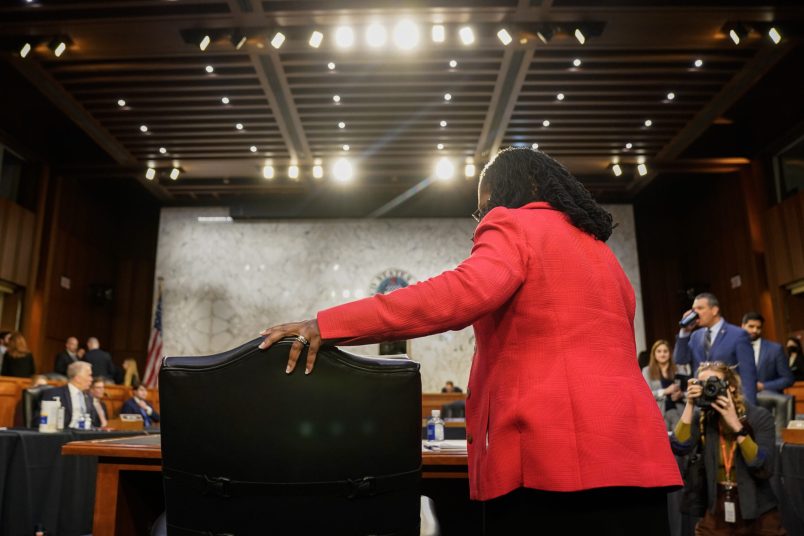Senate Republicans don’t have the votes to take down Judge Ketanji Brown Jackson, but they’ve used her confirmation process to broadcast their intention to roll back decades of civil rights progress.
In public remarks, leading Republicans have almost casually and with little fear of political recrimination begun to relitigate same-sex marriage, contraception and interracial marriage. With a robust 6-3 conservative majority on the Supreme Court, the GOP’s ambition to rework the privacy jurisprudence underlying many of the civil rights gains of the last 60 years isn’t idle aspiration but a very real threat.
If Republicans retreated on gay marriage over the past decade, it was a tactical retreat only. They’ve renewed their focus on 2015’s Obergefell v. Hodges, the case that established the right of same-sex couples to marry. Senate Republicans characterized it as precedent wrongly decided, as an unenumerated right spun out of thin air.
“They’ve been targeting Obergefell since the day it was decided,” David Cohen, a professor at Drexel University’s Thomas R. Kline Law School, told TPM. “The right-wing legal movement has never moved on.”
Some other case fixations that surfaced during the Jackson confirmation, both inside and outside the hearing room, shocked legal experts in a way that the calls to overturn Obergefell didn’t.
One of those was Griswold v. Connecticut, the case that established a right to privacy related to the use of contraceptives. Sen. Marsha Blackburn (R-TN), a member of the Senate Judiciary Committee, called the 1965 decision “constitutionally unsound” precedent.
More shocking a position still came from Sen. Mike Braun (R-IN), who, speaking to a conference call of local reporters, argued that the case legalizing interracial marriage nationwide, Loving v. Virginia, should be overturned.
“When you want that diversity to shine within our federal system there are gonna be rules and proceedings that are gonna be out of sync with maybe what other states would do,” he said. “It’s the beauty of the system — that’s where the differences among points of view in our 50 states ought to express themselves.”
When asked further if he was really saying he’d leave the legality of interracial marriage up to individual states, he said yes.
“That’s something that if you’re not wanting the Supreme Court to weigh in on issues like that, you’re not gonna be able to have your cake and eat it too, I think that’s hypocritical,” he added.
He later walked back the comments, claiming not to have understood the question which was posed to him in two different ways.
The senators aren’t waiting for the fall of Roe v. Wade, expected this summer, to question other rights, many of which flow from a similar understanding of the privacy and personal autonomy the Constitution grants.
“What’s shocking about it is that it’s a direct attack on the idea of substantive due process and the whole constellation of privacy rights,” said Jessie Hill, associate dean and professor at Case Western Reserve University School of Law. “No one made an attempt at pretense, that abortion is different or that same-sex marriage is less traditional — it reveals the extent to which this was a full-frontal attack on all of those concepts.”
The Quiet Part Out Loud
The hearings marked a change from how the mainstream right-wing legal movement has talked about these cases.
In the banner case Dobbs v. Jackson Women’s Health Organization, expected to be the forum where the Supreme Court overturns Roe, the state of Mississippi at least gestured in the direction of arguing that overturning Roe does not necessarily mean overturning Griswold.
“Consistent with these points, Griswold v. Connecticut, 381 U.S. 479 (1965), on which Roe relied and which applied the most expansive approach to the right of privacy among pre-Roe cases, finds grounding in text and tradition,” the state writes, contrasting it to Roe’s supposed groundlessness.
While some experts found this argument weak — it’s “completely unconvincing,” Hill said — it shows that the norms accompanying a right the public has become accustomed to over 50 years compelled them to at least pretend that Griswold isn’t threatened.
The imminent death of Roe seems to have moved that Overton window.
While opposition to Griswold may strike listeners as stunningly antiquated, it does have seeds in some of the more rabid right-wing movements. Some hardcore anti-abortion groups have been calling for its fall in the same filings where they primarily advocate for overturning Roe.
But Braun’s opposition to Loving is something else entirely.
“Loving was a shock,” Cohen said. “You’re not supposed to say that out loud even if you believe it, which hopefully very few people do. It was this great moment in Supreme Court history that solidified the commitment to end the Jim Crow era.”
If the point though, as Hill posits, is to roll back the civil rights gains of the 20th century, this is the natural progression.
To some Court watchers, it’s less a question of whether this universe of rights is on the chopping block and more how soon they will be.
“The big question in my mind is whether the Court lurches quickly to the right with broad rulings that have widespread implications—for example by holding there is no right to privacy, which would call into question not just abortion rights, but also the right to sell and use contraception and perhaps even legal protections for LGBT—or whether they will whittle away at these rights over several years,” Doug Spencer, associate professor at the University of Colorado Law School, told TPM.



